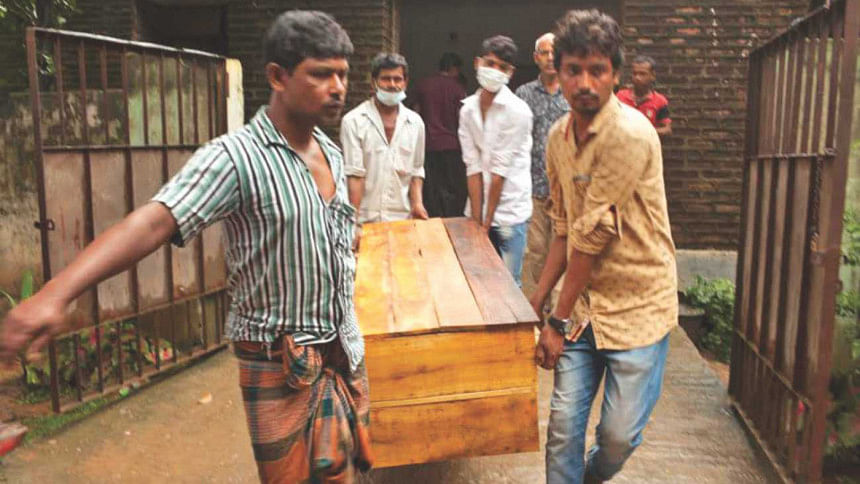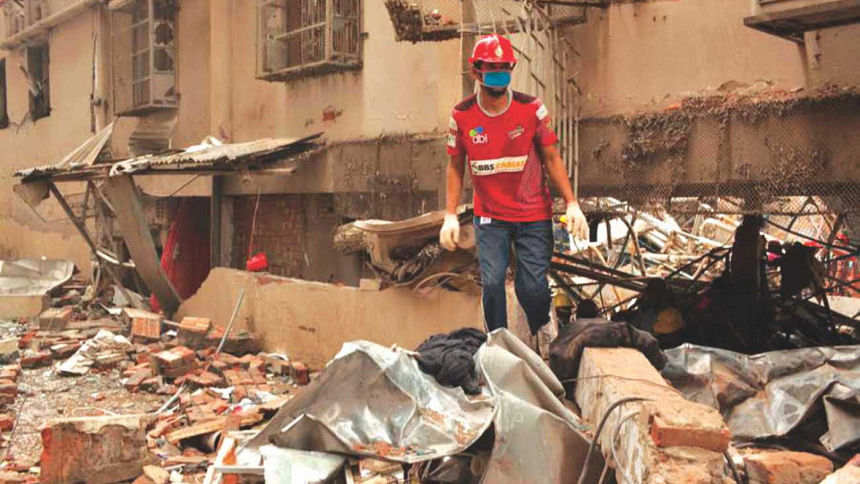The deaths could have been prevented

The boiler explosion in a garments factory in Gazipur last Monday once again highlighted the government's inability to monitor the 5000-odd authorised boilers across the country.
To put it simply, a boiler is a tank in which water is heated and the steam generated from it is used for different purposes in factories right from heating and drying to power generation.
The spate of incidents that have taken place, especially in the recent past, suggests that the government's strategy of inspecting these boilers isn't working at all. Based on reports published on The Daily Star alone, boiler bursts have led to deaths of almost 100 individuals in the last five years. This figure includes the 40 individuals who died in a factory in Tongi last year and the blast last Monday in Gazipur.
The series of deaths isn't a surprise considering that the government has appointed just six inspectors to investigate all the authorised boilers across the country.
According to an inspector of the Office of the Chief Inspector of Boilers, a government agency under the industries ministry, which is responsible for these inspections, it is 'impossible' to inspect so many factories with such little human resource.
"It's absurd. It's not only difficult, but it's impossible. That's all I can say," the inspector tells The Daily Star, on condition of anonymity. When you observe the lengthy process of inspecting these factory boilers, you tend to understand the statement made by the inspector.
It takes at least five days to inspect a boiler. At first, the factory owner needs to switch the boiler off and then cool it naturally. That process itself takes at least 24 hours. After that, the nuts and bolts of the boiler are dismantled and cleaned. The tax inspector is then supposed to arrive and conduct a series of tests. That involves visual inspection, conducting a hydraulic test and hammering the boiler at high pressure. Only after that can an inspector actually give a certificate to the factory. Again, an inspector can conduct a host of other tests, if he feels that the boiler is old or if he is not confident about it.
Once all these tests are completed, he can provide the factory a certificate. The credibility of that certificate might last from two months to a year. It is a tedious process and is not something that six inspectors can do in a year.
According to Kalpona Akter, the Executive Director of the Bangladesh Center for Worker Solidarity, the inspection of these boilers isn't done properly due to the lack of human resource.
"The incident in Gazipur attracted plenty of attention because the death toll is high. In reality, boiler explosions are quite common. We just don't get to hear about them often. Even if the workers don't die, they get severely injured. And the main reason behind this is that these boilers are not checked properly," says Akter.
"It's not just the 5000 factories that are using boilers. There are other unauthorised boilers as well and the inspectors should ideally be checking those too. But it's not possible with just these many inspectors," she adds.

The future of the boiler inspections seems bleak at the moment. According to a government official, a proposal was supposedly sent to the ministry to appoint 350 more inspectors at the office that deals with the inspection of boilers more than a year back. The unfortunate aspect is that despite the urgent need of such inspectors, that proposal seems to be a long way away from making it to the next stage.
Moreover, the factory was covered by the Accord on Fire and Building Safety in Bangladesh, which is a legally binding agreement between global brands and retailers and trade unions and was designed to build a healthy Bangladeshi garments industry following the Rana Plaza tragedy in 2013. The Accord had instructed the factory to construct a separate boiler room and seal and protect all openings to maintain the required fire separations in 2015 during an independent inspection. Although the factory had made the adjustments suggested by the Accord, it was not enough to prevent an explosion.
As Scott Nova, the Executive Director of the Worker Rights Consortium, a witness signatory to the Accord notes, "Boilers are not presently covered in the Accord standard, or the Alliance standard, and are not part of the inspections. The standard requires the separation of the room containing the boiler, using fire-rated construction, but does not require that the machinery itself be inspected. A powerful explosion, like the one yesterday, cannot be contained by a fire wall. It is therefore essential to inspect the boilers themselves."
The Accord's Witness Signatories have advocated since 2014 for the Accord to cover boilers. "We called for this again, last year, after a fatal boiler explosion at a factory making plastic packaging, unrelated to the garment industry. It should not have required a major disaster in a garment factory to compel brands and retailers to act," states a statement published by four international labour rights groups on July 4 concerning a boiler explosion at Multifabs, Ltd. The groups were Clean Clothes Campaign, International Labor Rights Forum, Worker Rights Consortium and Maquila Solidarity Network, all of whom were witness signatories.
Kalpona Akter, whose organisation is currently working on finding out the root cause of the boiler explosion in Gazipur, perhaps best describes the urgency needed.
"Before we had electric boilers and now most of them are run on gas. I don't know if you have seen the photos of the dead from Gazipur. Their necks were separated from their bodies. These were painful and horrific deaths. We desperately need the inspection system to improve."

 For all latest news, follow The Daily Star's Google News channel.
For all latest news, follow The Daily Star's Google News channel. 



Comments